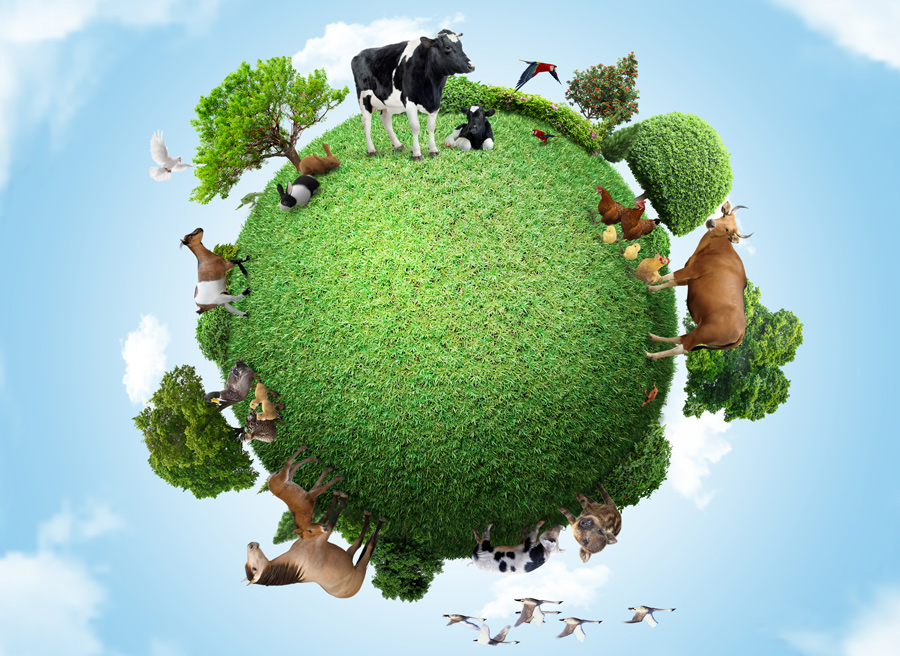UK farmers leading the way on climate change
4th November 2019
Farmers Guide editor Rachel Hicks applauds the agri industry for taking such huge steps towards net zero greenhouse emissions.
Farmers Guide editor Rachel Hicks applauds the agri industry for taking such huge steps towards net zero greenhouse emissions.
Rest assured I won’t mention the B-word, as it remains to be seen whether we’ll be leaving the EU with a deal or not. But the other current conversation piece, climate change, has a much more positive outlook, particularly for the agricultural community.
As one of her final acts as Prime Minister earlier this year, Theresa May announced a formal commitment to Britain reaching net zero carbon emissions by 2050, made via an amendment to the Climate Change Act on 27th June 2019. At the time, energy and clean growth minister Chris Skudmore said: “The UK kick-started the Industrial Revolution, which was responsible for economic growth across the globe but also for increasing emissions.
“Today we’re leading the world yet again in becoming the first major economy to pass new laws to reduce emissions to net zero by 2050 while remaining committed to growing the economy – putting clean growth at the heart of our modern Industrial Strategy.”
Bearing in mind that the UK’s 2050 net zero target is considered to be one of the most ambitious in the world, it’s incredibly encouraging to see the British farming industry taking this one stage further, with an even more determined goal to deliver the same result by 2040.
In response to the RSPB’s 2019 State of Nature report, NFU president Minette Batters said:
“One of the biggest issues the report identified is climate change. I’m pleased that farming is showing leadership in tackling this huge challenge that we all face.
“We’ve set a target to reach net zero greenhouse gas emissions by 2040 through improving land management and changing land use to capture more carbon, and planting more trees and hedges. Reducing our emissions and counterbalancing them through improvements in productivity and renewable energy production will also play an important role.”
Following the release of the United Nations’ Intergovernmental Panel on Climate Change’s special report on Climate Change and Land, released in August 2019, media coverage would have you think that reducing meat consumption is the key to positively affecting climate change. The NFU points out that the report actually takes a more balanced approach, by recognising that: ‘land is both a source and a sink of greenhouse gas emissions, and; the consumption of food, feed, fibre, timber and energy have caused unprecedented rates of land and freshwater use, but that improved agricultural and forestry productivity have supported consumption and food availability for a growing population.’ It’s worth noting that farming only accounts for one per cent of UK water usage, for example.
Mitigating the level of risk of climate change is key to the agri industry. The IPCC report highlighted that this depends on both the level of warming, and on how population, consumption, production, technological development and land management patterns evolve.
So, how can British farming reach this 2040 goal? The NFU has laid out three pillars of activity in its recent report ‘Achieving Net Zero: Farming’s 2040 Goal’.
Pillar one suggests a variety of measures to boost productivity and reduce emissions, as identified by the Committee on Climate Change (CCC), including ideas such as: using controlled release fertilisers and inhibitors to increase efficient use of nitrogen and reduce emissions; introducing feed additives to reduce methane emissions from ruminant livestock; precision farming for crops to deliver nutrients and crop protection efficiently; loosening and preventing soil compaction in cropland and pasture; gene editing for disease resistance; and a range of energy efficient measures.
Pillar two discusses the conservation and enhancement of critical carbon resource by improving land management and changing land use to capture more carbon, for example producing bigger hedgerows, planting more woodland and more carbon-rich soils such as peatland and wetland soils.
Pillar three focuses on ‘boosting renewable energy and the bioeconomy to displace greenhouse gas (GHG) emissions from fossil fuels and to create GHG removal through photosynthesis and carbon capture.’
What is obvious from the NFU’s report is that the farming industry cannot achieve this alone. It states farmers will need to be able to access specialist schemes which provide the knowledge, new technologies and tools so that, ultimately, productivity and profitability can continue while also meeting the environmental goals. This is where a domestic agricultural policy is needed, with support from Defra and the Department for Business, Energy and Industrial Strategy.
It’s clear that farmers will have a huge role to play in meeting this target, and many have already embarked on a long journey of improvement. The IPCC Twitter account put it succinctly, when it announced the release of its report with: “Land is where we live. Land is under growing human pressure. Land is a part of the solution. But land can’t do it all.”



